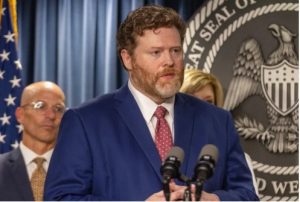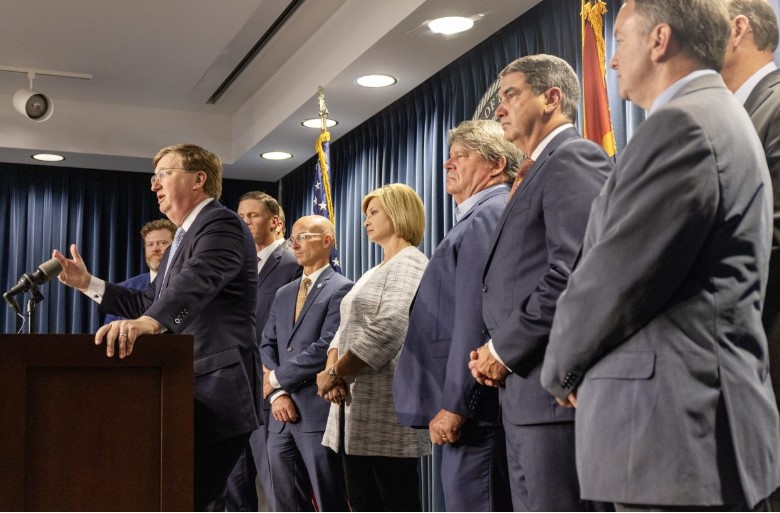
Gov. Tate Reeves announces his plans for a series of Medicaid reimbursement reforms during a press conference at the Walter Sillers Building in Jackson, Miss., on Thursday, September 21, 2023. Credit: Eric Shelton/Mississippi Today
Gov. Tate Reeves, after months of inaction, has unveiled a plan he says will turn Mississippi’s health care crisis around.
However, even some health care experts were stumped by how the Governor’s proposed reforms will work.
The plan, which Reeves announced at a press conference Thursday while flanked by state health care leaders, is essentially a complex scheme to increase extra payments hospitals get for treating patients on Medicaid — and notably doesn’t include Medicaid expansion.
Some Mississippi leaders say Reeves’ ideas aren’t even that new. It’s not certain they’ll be approved, either.
The announcement comes less than two months before Election Day, and after his opponent in the gubernatorial race, Democrat Brandon Presley, has repeatedly stated his intention to expand Medicaid if elected and largely campaigned on the state’s hospital crisis.
Two things were clear at the conference: Reeves claims the changes would put a much-needed $700 million in hospitals’ pockets, and he does not plan to expand Medicaid.
Everything else, however, was not as easy to understand.
How will Gov. Reeves’ plan work?
The plan relies on two major changes that bolster supplemental payments to hospitals for the care they provide to people with Medicaid. Supplemental payments are extra payments hospitals receive to offset low Medicaid reimbursement rates or uncompensated care, which is money hospitals lose caring for patients who are uninsured and can’t pay their hospital bill. Medicaid is a federal-state program that provides health coverage to millions of people in the U.S., including low-income adults, children, pregnant women, elderly adults and people with disabilities. The income requirement for people in Mississippi to qualify is extremely stringent.
The first is a change to the Mississippi Hospital Access Program, which typically pays hospitals for the gap between payments for services rendered for Medicaid managed care patients (which are usually lower) and Medicare patients (which are usually slightly higher). Under the proposed changes, hospitals will instead be paid for the gap between Medicaid patients and people insured by commercial plans, which tend to reimburse at higher rates.
The state Division of Medicaid was granted a similar change to the program in March for outpatient services, resulting in $40.2 million for hospitals. However, Medicaid officials had expected it to generate an additional $450 million. But because Mississippi’s average commercial rate is so low, the payout was much less.
What’s not clear is how, in Reeves’ plan, the average commercial rate results in nearly triple what hospitals typically get for these payments — going from a total of $562 million to $1.522 billion. Reeves didn’t say at the press conference what average commercial rate was actually being used (whether a state, regional or national rate).

Drew Snyder, Mississippi Division of Medicaid executive director, answers questions from the media after Gov. Tate Reeves announced his plans for a series of Medicaid reimbursement reforms during a press conference at the Walter Sillers Building in Jackson, Miss., on Thursday, September 21, 2023. Credit: Eric Shelton/Mississippi Today
When asked what had changed since the spring regarding these rates, Medicaid Executive Director Drew Snyder did not directly answer the question.
“I think the difference is, we got the right people in the room … sometimes it makes sense to get a second opinion,” he said before stepping back in line on stage.
The second initiative modifies the Upper Payment Limit Supplemental Payments, which are aimed at also increasing payments for hospitals that receive low payments from Medicaid. This program will yield an increase of an additional $137 million in fiscal year 2024, according to Reeves.
State leaders did something similar earlier this year after the Mississippi Hospital Access Program projections came in much lower than originally expected, said Tim Moore, former leader of the state hospital association. It resulted in an extra one-time payment of $137 million.
The supplemental payment programs are meant to reduce disparities in insurance payments and the cost of caring for uninsured people. By changing them, the state is drawing down more federal money because of our state’s high Federal Medical Assistance Percentage match, which is the highest in the country at 77.27% because of our state’s high poverty rate. Hospitals have to put up more in “bed taxes” for the state portion, and then the federal government matches.
In other words, if a Medicaid patient receives a service at a Mississippi hospital that costs $100, the hospital is reimbursed $77.27 from federal funds. The remaining $22.73 must be paid by the state – that $22.73 comes from the hospitals themselves in the form of a tax.
Harold Miller, leader of the Center for Healthcare Quality and Payment Reform described it this way: “When the state is paying for a Medicaid service, the state has to find the state share — that 23% — somewhere. They have to find that money, and ordinarily they would have to tax the taxpayers to do that.” Instead, Mississippi asks the hospitals for that money, he said.
In short, hospitals will have to pay $178 million in taxes for Mississippi Hospital Access Program payments to go up by $960 million, Upper Payment Limit payments will yield $137 million and disproportionate share hospital payments — which make up the difference for hospitals that lose money on serving a significant population of Medicaid-insured and uninsured people — will decrease by $230 million because the other payments are bridging the gap. The net gain for hospitals will be $689 million total.
Who will the plan help?
Experts agree this plan will keep hospitals open for longer. Even if it’s unclear how the expected payments will increase, it’s still a significant amount of money — money that hospitals have been asking for for a long time. However, critics say it’s not ensuring more people receive health care.
According to federal data, Mississippi has the highest uninsured rate of people aged 18-64 in the country, as of September. About one in every six Mississippians is uninsured.
Emergency rooms by law cannot turn down people, regardless of their insurance status, who come for care — but doctors’ offices can and so can pharmacies. That means people who are uninsured in Mississippi, one of the unhealthiest states in the nation, cannot receive preventative care or medications that they need. They generally must rely on the emergency room for their health care needs.
“People typically need a lot more care than care in a hospital, and a lot of that care is preventive care… outpatient care,” said Adam Searing, an associate professor at Georgetown University’s McCourt School of Public Policy’s Center for Children and Families whose work focuses on Medicaid. “If you get cancer and you need prescriptions and drugs and outpatient care from a team of specialists, this has nothing to do with that. So, the key differences, this is an issue about the finances of hospitals.
“And Medicaid expansion is about financial security for families.”
How much money is it bringing to hospitals?
Reeves said a little over $689 million will go to the state’s hospitals under this plan.
And although he said Thursday the money would benefit all hospitals, it appears larger hospitals will benefit most, even though most agree that small rural hospitals are the facilities feeling the strain of the health care crisis most acutely.
Additionally, nearly half of the money — 45% or about $309 million — will go to hospitals that have left the state hospital association in recent months. In the spring, after the Mississippi Hospital Association’s PAC made a $250,000 donation to Presley, several hospitals left the organization.
Most of those hospitals’ leaders stood behind Reeves as he announced his plan Thursday.
Is this a new plan?
Reeves said at the press conference this plan has been in the works for four to five months.
According to Tim Moore, former head of the state hospital association, and another state leader, that’s not true.
A year ago, Moore learned of similar measures in Louisiana and brought the idea to state leaders. Lt. Governor Delbert Hosemann recently told Mississippi Today that hospital payment initiatives were discussed by stakeholders last year, but the Division of Medicaid told his office that those changes weren’t possible.
Will it cost the taxpayers anything?
Reeves repeated at the conference that the changes would come at no cost to taxpayers, though he noted Snyder and his division employees are paid by state tax dollars.
That’s mostly true — taxpayers will likely not feel the brunt of this big tax increase for hospitals, according to one expert. Even if hospital charges increase, it should be eaten by the insurance companies and services for people who are uninsured will continue to go uncompensated and be claimed as charity care.
Is it final?
The plan is being submitted to the Centers for Medicaid and Medicare Services for approval. Snyder estimated at the conference that the state would likely hear from the federal government within two to three months. If it’s approved, it would be retroactively effective beginning July 1, 2023.
It’s hard to say what the likelihood of approval is, though several other states have passed similar Medicaid reforms intended to draw down more federal dollars.
One expert said it was unlikely that Mississippi state leaders announced the plan without expecting CMS approval, and historically, the agency has erred on the side of keeping hospitals open — even if it comes at the cost of forgoing expansion.
How is this different from Medicaid expansion?
Medicaid expansion has long been pointed to as a solution to the state’s worsening hospital crisis. Republican state leadership – Reeves most prominently – has staunchly opposed the policy adoption, despite support from a majority of Mississippians.
At the press conference Thursday, Reeves repeatedly incorrectly referred to the program as “welfare,” and claimed the solution to the issue was putting more people in the workforce. He said if more people are added to Medicaid’s rolls, hospitals will keep losing money because Medicaid payments are so low.
That’s better than losing money on people who are uninsured, said Adam Searing, the associate professor whose work focuses on Medicaid.
“These are two disconnected things,” he said. “Reimbursement rates for hospitals and expanding Medicaid are completely separate issues.”
While hospital leaders agree that these policy reforms will make a huge difference for many hospitals in the state, it still might not be enough to single handedly solve the crisis. In other states, such as Louisiana, similar policy reforms work in tandem with Medicaid expansion to create a holistically supported health care system.
The way Moore sees it, the state is putting up $170 million for a $700 million net gain, when with expansion, it could put up $100 million for a $1 billion reward.
States that have not expanded Medicaid have been offered a financial incentive to do so — an estimated $600 million in federal funds over two years.
And, despite more hospitals that will probably be able to stay open as a result of these reforms, uninsured Mississippians still won’t have health care. That means they will have to continue to rely on emergency rooms for their medical care — the most expensive place to receive health care — and uncompensated care costs will continue.
Searing said these reforms “improve the financial bottom line for some hospitals” and keep them open longer, but people are still going without health coverage.
“You’re really not solving the problem,” he said. “You’re just putting a Band-Aid on one aspect of it.”
This article first appeared on Mississippi Today and is republished here under a Creative Commons license.


